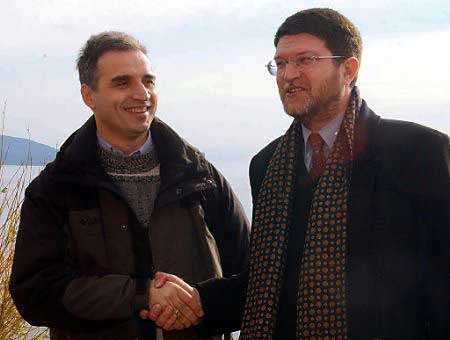Prevlaka back in CroatianHands?
Croatian Foreign Minister Tonino Picula (right) and his Yugoslav counterpart GoranSvilanovic
Croatia, Yugoslavia Sign Landmark Border Deal
Tue December 10, 2002 09:46 AM ET
KONFIN BORDER CROSSING, Croatia (Reuters) - Croatia and Yugoslavia signed a landmark border deal on a disputed Adriatic peninsula Tuesday.
The agreement will pave the way for a quick end to a 10-year-old U.N. peacekeeping mission there.
The Prevlaka peninsula lies on Croatia's southernmost border with Montenegro, which together with Serbia makes up Yugoslavia.
The strip of land, a couple of miles long and jutting into the Adriatic, is of strategic importance because it controls access to the spectacular, fjord-like Boka Kotorska bay, Montenegro's major deep seaport.
Under the deal, both countries will keep the area demilitarized and have joint sea police patrols, although the peninsula will be part of Croatian territory.
Yugoslav navy ships will be able to sail through the channel leading into the bay, but will not be allowed to stop, conduct military training or any other military activity in the area.
"This deal is a big step in normalizing relations (with Yugoslavia). But it has more than bilateral importance.... It contributes to regional stability," Croatian Prime Minister Ivica Racan told reporters in Zagreb after the deal was signed.
The peninsula has been monitored by a small U.N. observing mission since 1992, following Croatia's secession and war for independence against Yugoslavia in 1991.
Croatia has always seen Prevlaka as part of its territory. But Belgrade, under former President Slobodan Milosevic, wanted the area to remain part of Yugoslavia, mostly because of its strategic importance.
The deal -- which also includes a temporary agreement on police and customs jurisdiction, de-mining and new rules governing border crossings -- was signed by Croatian Foreign Minister Tonino Picula and his Yugoslav counterpart Goran Svilanovic.
Both are members of reformist coalitions that came to power in 2000 and moved to restore ties disrupted by the 1991-95 wars.
"With this deal, this area stops being a point of conflict and becomes a point of cooperation," Picula said.
The deal takes effect immediately, while a detailed agreement including the final border on land and sea will be negotiated at a later stage.
The United Nations is scheduled to end its tiny mission on the peninsula -- used as a missile test site during the communist era -- on December 15.
Prevlaka back in CroatianHands?
Croatian Foreign Minister Tonino Picula (right) and his Yugoslav counterpart GoranSvilanovic
Croatia, Yugoslavia Sign Landmark Border Deal
Tue December 10, 2002 09:46 AM ET
KONFIN BORDER CROSSING, Croatia (Reuters) - Croatia and Yugoslavia signed a landmark border deal on a disputed Adriatic peninsula Tuesday.
The agreement will pave the way for a quick end to a 10-year-old U.N. peacekeeping mission there.
The Prevlaka peninsula lies on Croatia's southernmost border with Montenegro, which together with Serbia makes up Yugoslavia.
The strip of land, a couple of miles long and jutting into the Adriatic, is of strategic importance because it controls access to the spectacular, fjord-like Boka Kotorska bay, Montenegro's major deep seaport.
Under the deal, both countries will keep the area demilitarized and have joint sea police patrols, although the peninsula will be part of Croatian territory.
Yugoslav navy ships will be able to sail through the channel leading into the bay, but will not be allowed to stop, conduct military training or any other military activity in the area.
"This deal is a big step in normalizing relations (with Yugoslavia). But it has more than bilateral importance.... It contributes to regional stability," Croatian Prime Minister Ivica Racan told reporters in Zagreb after the deal was signed.
The peninsula has been monitored by a small U.N. observing mission since 1992, following Croatia's secession and war for independence against Yugoslavia in 1991.
Croatia has always seen Prevlaka as part of its territory. But Belgrade, under former President Slobodan Milosevic, wanted the area to remain part of Yugoslavia, mostly because of its strategic importance.
The deal -- which also includes a temporary agreement on police and customs jurisdiction, de-mining and new rules governing border crossings -- was signed by Croatian Foreign Minister Tonino Picula and his Yugoslav counterpart Goran Svilanovic.
Both are members of reformist coalitions that came to power in 2000 and moved to restore ties disrupted by the 1991-95 wars.
"With this deal, this area stops being a point of conflict and becomes a point of cooperation," Picula said.
The deal takes effect immediately, while a detailed agreement including the final border on land and sea will be negotiated at a later stage.
The United Nations is scheduled to end its tiny mission on the peninsula -- used as a missile test site during the communist era -- on December 15.